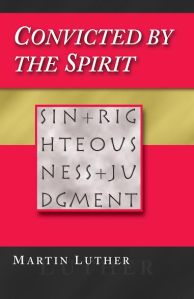
For judgment I came into this world…. I did not come to judge the world, but to save the world (John 9:39, 12:47)
It’s not about you: It’s about Jesus for you – and against you.
What?!
All of us who are in Christ know that we do not trust our Lord as we ought.* When we talk about such matters, we are not talking about our justification – for it is not the strength of our faith that saves – but rather our continual Christification (as Pastor Jordan Cooper has called it), or sanctification.
But what about the person who does not trust Jesus Christ at all? Can they be convicted of the sin of not believing in Jesus? Of not being willing to be the trick or treat bag that receives God’s good gifts? (as the late Klemet Preus, quoting his father Robert, so aptly put it)
Yes. In John 16:8-11 we read:
8 And when he comes, he will convict the world concerning sin and righteousness and judgment: 9 concerning sin, because they do not believe in me; 10 concerning righteousness, because I go to the Father, and you will see me no longer; 11 concerning judgment, because the ruler of this world is judged.

From the Scriptures, we see that the Holy Spirit is Christ’s Spirit – and He not only brings people to Christ but convicts them that they have not yet been brought, or come, to Christ.
This passage from John’s Gospel used to be a staple, go-to text in orthodox Lutheranism. Coinciding with the advent of modern, critical forms of theology, this is one of the texts that has been relegated to the background. These days, even many of us conservative Lutherans are not eager to bring this issue up. Rather, when we talk about Jesus Christ we are determined that this will always be in the context of the Gospel, narrowly understood – as our forgiveness, life, and salvation, our rescuer from sin, death, and the devil! Jesus is pure grace and speak not another word to me! I demand this….
Going along with this, adherents of schools like those of Erlangen are eager to use existentialist philosophy as a theological grounding, emphasizing instead – to the exclusion of everything else – the conviction of sin that might come from the creation itself. Martin Luther talked about how it is possible for a person to even be terrified by the rustling of a leaf (a friend points out this is a reference to Lev. 26:36 and actually illustrates the faintness that befalls those who break God’s law), and these theologians are all over this.
Of course on the one hand this is reasonably in line with what the Apostle Paul wrote in Romans chapters 1-3 and with Martin Luther’s own approach to “natural theology”. Further, we can and should note that when it comes to conviction of sin, it is not only a sense of the Creator’s justice and corresponding wrath that is a cause here, but His kindness as well.
For in Romans 2:4, we read that it is God’s His kindness that has a role in leading us to repentance (this does not mean that one can insist that contrition is only genuine and godly sorrow if it has been produced by the love of God**). In one sense the creation really is ambiguous about the overall goodness of God (see here for a short video clip dwelling on the heartlessness and cruelty of nature) – and yet in another sense, we all see the beauty that remains in the fallen creation and know a measure of joy – for the Creator puts it in all men’s hearts (see Acts 14:17). By the Holy Spirit, we are convicted by the “whole package” of God whose divine nature is not only justice, but above all, love (and it is precisely because he, not sinful man, is good and love that we cannot come to Him by our own “spiritual powers”, converting ourselves).

But of course, we know that Christ reveals to us that whole package in even more detail – chasing out the ambiguities and doubts surrounding God’s goodness and love! So: how much more so can we talk about spiritual conviction when man sees the Creator God incarnate, Jesus Christ! Truly in Him, we see how the promise of grace is wrapped up in His judgment and His judgment is wrapped up in the promise of grace. The law is wrapped up in the gospel and the gospel is wrapped up in the law (before you choke on that phrase note the caption on the picture that leads off this blog post).
He is both the One who will judge the world in righteousness and also the merciful one eager to show grace. And when grace is shown, there is always corresponding punishment of the wicked.
We want to be on the right side of this.
Am I interpreting all of this right? Some reading this might wonder. If you think that I am not getting things quite right perhaps a look at Romans 3 will help:
19 Now we know that whatever the law says it speaks to those who are under the law, so that every mouth may be stopped, and the whole world may be held accountable to God.20 For by works of the law no human being[a] will be justified in his sight, since through the law comes knowledge of sin.
As Martin Luther and C.F.W. Walther would remind us, understanding the proper function of law and gospel is not, ultimately, about knowing principles about how God works and a) applying them to get guaranteed results or b) not being intentional in trying to get results (see the paper by Holger Sonntag below). We can, however, say that it is this: it is the art of the Holy Spirit of God leading people into personal confrontation with the living God, perhaps specifically focusing on Jesus Christ – and the corresponding comfort that comes from receiving and believing in the narrow Gospel message. We either paint with Him in His art – that is, using His methods – or not (for more specifics about the complexities here, read the free paper by Pastor Holger Sonntag on the third use of the law in Martin Luther’s Antinomian Disputations referenced here).***
But knowing this is just background for what I suggest we Lutherans really need to be talking about more today, which is this: while it is inevitable that when doing theology a limited amount of talk about ourselves is going to happen, should we not be emphasizing that we first and foremost focus on God and what He is saying – and because God focuses on us sinners, we also talk about us as *He* talks about us?

In other words, when it comes to explaining the message of the Scriptures, we dare not lay the emphasis on our interpretation or imagination – or even the church’s interpretation or imagination – and should this not especially hold true in this process of conviction and conversion (initially and continually)?
While it at times may well be reasonable to point out that the interpreter of Scripture cannot “escape his own shadow…”, when we are talking about standing before Almighty God, perfect in His holiness, is this appropriate? If we do this, do we not become “I theologians” who practice a form of magisterial, not ministerial interpretation? Even today, most all confessional Lutherans are eager to point out the dangers of a magisterial use of reason (here is a nice essay from Steven Hein introducing Luther’s complex views regarding the role of reason). They are not so cautious when it comes to the matter of biblical interpretation.
Must we not, standing naked before God, “escape our own shadow”? Think about what Pastor Todd Wilken, the host of Issues ETC has said as regards his complaints about much contemporary Christian music: when you are courting a woman, and her father asks you what you find compelling about his daughter, you don’t talk about what she does for you – how she makes you feel and such. You talk about her, her character, her qualities, who she is.”****
I submit that passages like Romans 3:19-20 in particular help us to remember that the validation of God’s word is never subject to our evaluation of its truthfulness to any degree whatsoever. Nor is the establishment of God’s word in any degree based on our critical evaluation of it.***** Nor it this the time for us to be emphasizing how we are inevitably interpreters of the words of others (perhaps even testing them against other things we know are confident are true) – in hearing these words it is we who are interpreted, for we are hearing the active words of the living Spirit of Christ (see more about an interesting battle that took place over issues related to this in the 16th century between Matthias Flacius and Caspar Schwenckfeld). It is only men veering towards or playing with death who dare to call these words “dead”.

Amen!?
Or, perhaps you think this a strong message…. In the event that you are feeling terrified or helpless, I offer you this:
Almighty God, our Heavenly Father, has had mercy upon us, and has given His Only Son to die for us, and for His sake forgives us all our sins. To them that believe on His Name, He gives power to become the sons of God, and bestows upon them His Holy Spirit. He that believes, and is baptized, shall be saved. Grant this, O Lord, unto us all
FIN
Notes:
*As just one example, the saintly Lutheran pastor Wallace Schulz says this: “Like all churches, we not only could do a little better, we need to do much better in reaching out to the lost and bringing them in. This is the will of God (1 Timothy 2:4)”
**Scripture speaks of God’s word being like a hammer that shatters (Jer. 23:29), but also says that “a gentle tongue can break a bone” (Proverbs 25:15). In Luther’s antinomian disputations he discusses Rom. 2 to some extent: God’s goodness, just like his wrath, can be a form of his law that leads us to repentance. In C.F.W. Walther’s eleventh thesis in The Proper Distinction Between Law and Gospel he only says that those who insist that a person must come to repentance through God’s kindness are in error: “To demand of a poor sinner that he must, from the love of God, be alarmed on account of his sins and feel sorry for them is an abominable perversion of Law and Gospel.” (p. 236, 1897 ed., note the “must”).
***Law and Gospel is a valuable light. But if the popular “theological shorthand” misses out on the complexity involved in the application of it to specific individuals in time it goes awry. Also, those who think that we can say things like the criterion of the law is the self are losing the plot. The criterion of the law would be God’s self, and He has made His will known.
It is critically important to note that both the law and the gospel have a wider and narrow sense. This is the context – the faith/ethical framework of sorts, in which we live and move and have our being. This realization is something many modern Lutherans seem to have lost.
****We find that if there is any human being that we should begin to focus on more and more besides the God-man, it is our neighbor, as we are continuously reminded and even inspired, in our heart of hearts with Christ, to consider others better than ourselves. In short, as we mature more and more we are always actually looking outside of our individual selves more and more – to God in faith and our neighbor in love.
*****We Lutherans who love apologetics ought to note this well.











